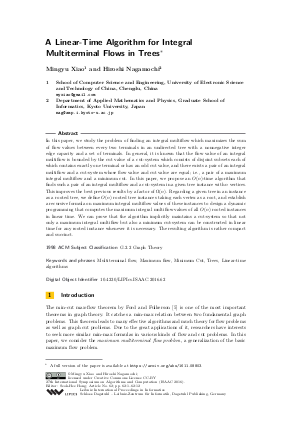A Linear-Time Algorithm for Integral Multiterminal Flows in Trees
Authors Mingyu Xiao, Hiroshi Nagamochi
-
Part of:
Volume:
27th International Symposium on Algorithms and Computation (ISAAC 2016)
Part of: Series: Leibniz International Proceedings in Informatics (LIPIcs)
Part of: Conference: International Symposium on Algorithms and Computation (ISAAC) - License:
 Creative Commons Attribution 3.0 Unported license
Creative Commons Attribution 3.0 Unported license
- Publication Date: 2016-12-07
File

PDF
LIPIcs.ISAAC.2016.62.pdf
- Filesize: 0.59 MB
- 12 pages
Document Identifiers
Subject Classification
Keywords
- Multiterminal flow; Maximum flow; Minimum Cut; Trees; Linear-time algorithms
Metrics
- Access Statistics
-
Total Accesses (updated on a weekly basis)
0Document
0Metadata
Abstract
In this paper, we study the problem of finding an integral multiflow which maximizes the sum of flow values between every two terminals in an undirected tree with a nonnegative integer edge capacity and a set of terminals. In general, it is known that the flow value of an integral multiflow is bounded by the cut value of a cut-system which consists of disjoint subsets each of which contains exactly one terminal or has an odd cut value, and there exists a pair of an integral multiflow and a cut-system whose flow value and cut value are equal; i.e., a pair of a maximum integral multiflow and a minimum cut. In this paper, we propose an O(n)-time algorithm that finds such a pair of an integral multiflow and a cut-system in a given tree instance with n vertices. This improves the best previous results by a factor of Omega(n). Regarding a given tree in an instance as a rooted tree, we define O(n) rooted tree instances taking each vertex as a root, and establish a recursive formula on maximum integral multiflow values of these instances to design a dynamic programming that computes the maximum integral multiflow values of all O(n) rooted instances in linear time. We can prove that the algorithm implicitly maintains a cut-system so that not only a maximum integral multiflow but also a minimum cut-system can be constructed in linear time for any rooted instance whenever it is necessary. The resulting algorithm is rather compact and succinct.
Cite As Get BibTex
Mingyu Xiao and Hiroshi Nagamochi. A Linear-Time Algorithm for Integral Multiterminal Flows in Trees. In 27th International Symposium on Algorithms and Computation (ISAAC 2016). Leibniz International Proceedings in Informatics (LIPIcs), Volume 64, pp. 62:1-62:12, Schloss Dagstuhl – Leibniz-Zentrum für Informatik (2016)
https://doi.org/10.4230/LIPIcs.ISAAC.2016.62
BibTex
@InProceedings{xiao_et_al:LIPIcs.ISAAC.2016.62,
author = {Xiao, Mingyu and Nagamochi, Hiroshi},
title = {{A Linear-Time Algorithm for Integral Multiterminal Flows in Trees}},
booktitle = {27th International Symposium on Algorithms and Computation (ISAAC 2016)},
pages = {62:1--62:12},
series = {Leibniz International Proceedings in Informatics (LIPIcs)},
ISBN = {978-3-95977-026-2},
ISSN = {1868-8969},
year = {2016},
volume = {64},
editor = {Hong, Seok-Hee},
publisher = {Schloss Dagstuhl -- Leibniz-Zentrum f{\"u}r Informatik},
address = {Dagstuhl, Germany},
URL = {https://drops.dagstuhl.de/entities/document/10.4230/LIPIcs.ISAAC.2016.62},
URN = {urn:nbn:de:0030-drops-68311},
doi = {10.4230/LIPIcs.ISAAC.2016.62},
annote = {Keywords: Multiterminal flow; Maximum flow; Minimum Cut; Trees; Linear-time algorithms}
}
Author Details
References
-
B. V. Cherkasskii. Reshenie odnoi zadachi o mnogoproduktovykh potokakh v seti [russian; a solution of a problem of multicommodity flows in a network]. Èkonomika i Matematicheskie Metody, 13(1):143-151, 1977.

-
Marie-Christine Costa, Lucas Létocart, and Frédéric Roupin. Minimal multicut and maximal integer multiflow: a survey. European Journal of Operational Research, 162(1):55-69, 2005.

-
Mariechristine Costa and Alain Billionnet. Multiway cut and integer flow problems in trees. Electronic Notes in Discrete Mathematics, 17(20):105-109, 2004.

-
William H. Cunningham. The optimal multiterminal cut problem. DIMACS series in discrete mathematics and theoretical computer science, 5:105-120, 1991.

-
J. R. Ford and D. R. Fulkerson. Flows in networks. Princeton university press, 1962.

-
Naveen Garg, Vijay V. Vazirani, and Mihalis Yannakakis. Approximate max-flow min-(multi) cut theorems and their applications. SIAM Journal on Computing, 25(2):235-251, 1996.

-
Naveen Garg, Vijay V. Vazirani, and Mihalis Yannakakis. Primal-dual approximation algorithms for integral flow and multicut in trees. Algorithmica, 18(1):3-20, 1997.

-
Torben Hagerup, Jyrki Katajainen, Naomi Nishimura, and Prabhakar Ragde. Characterizing multiterminal flow networks and computing flows in networks of small treewidth. Journal of Computer and System Sciences, 57(3):366-375, 1998.

-
Toshihide Ibaraki, Alexander V. Karzanov, and Hiroshi Nagamochi. A fast algorithm for finding a maximum free multiflow in an inner eulerian network and some generalizations. Combinatorica, 18(1):61-83, 1998.

-
Wolfgang Mader. Über die Maximalzahl kantendisjunkter A-Wege. Archiv der Mathematik, 30(1):325-336, 1978.

